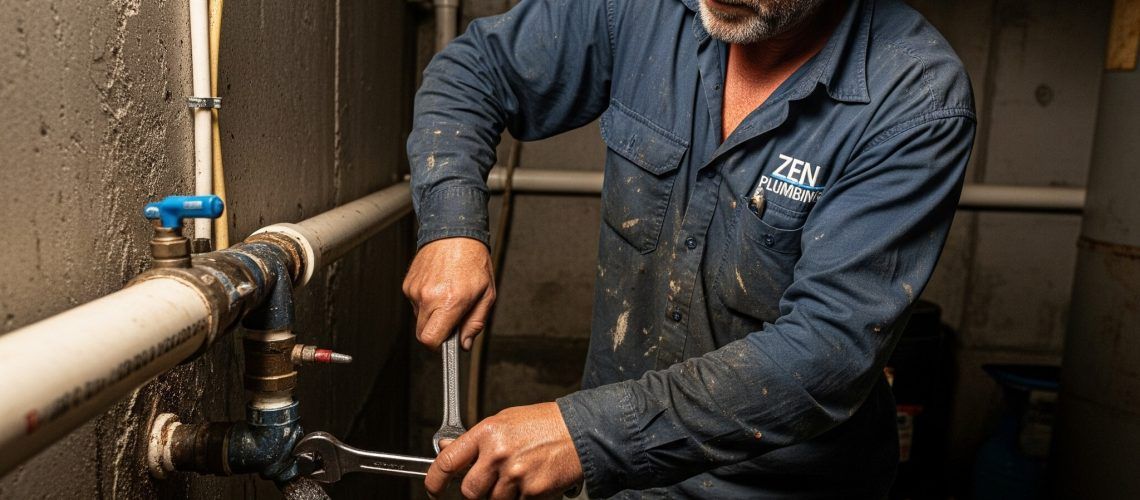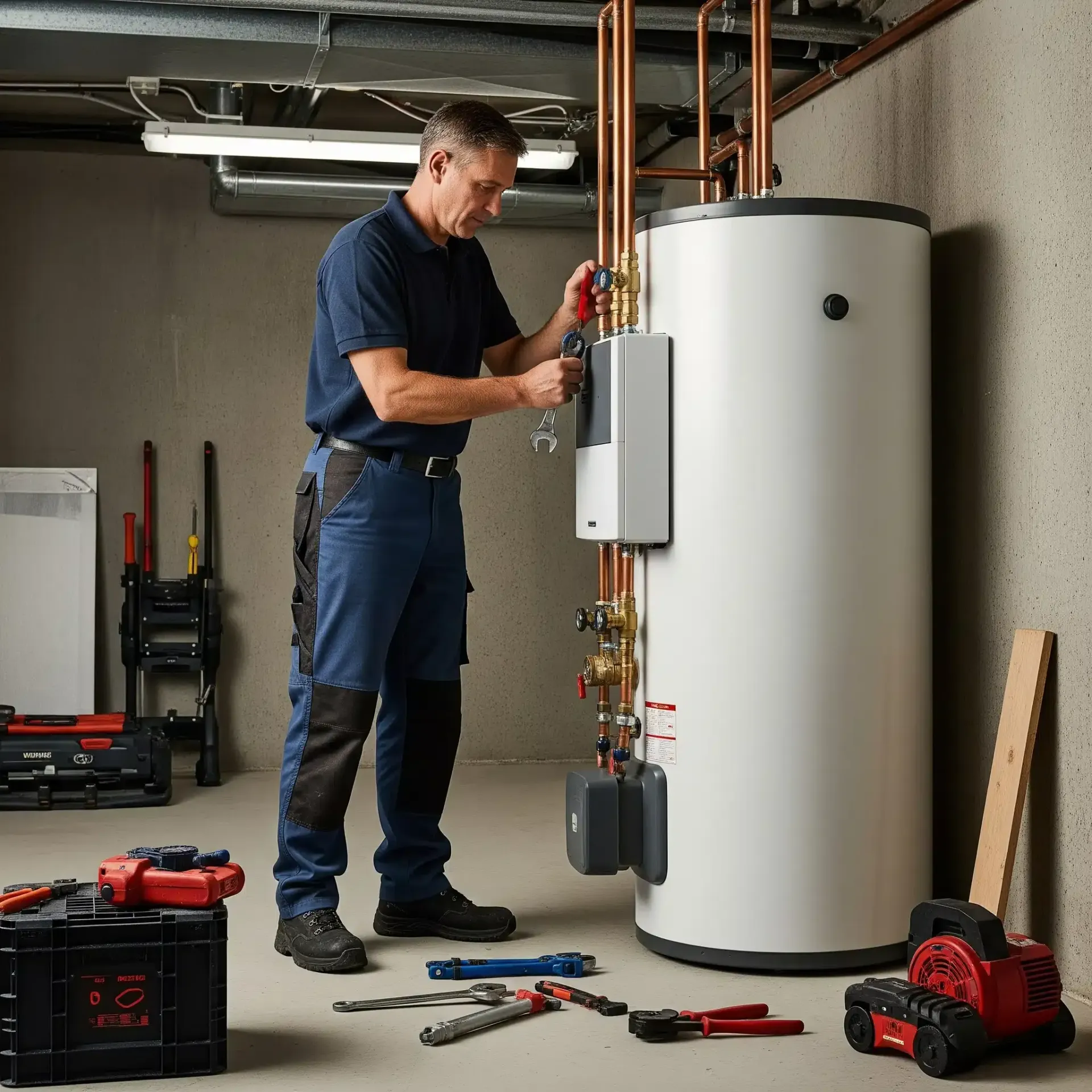Detecting Water Leaks in Your Home: A Comprehensive Guide
Practical Tips to Spot and Stop Leaks Before They Cause Damage
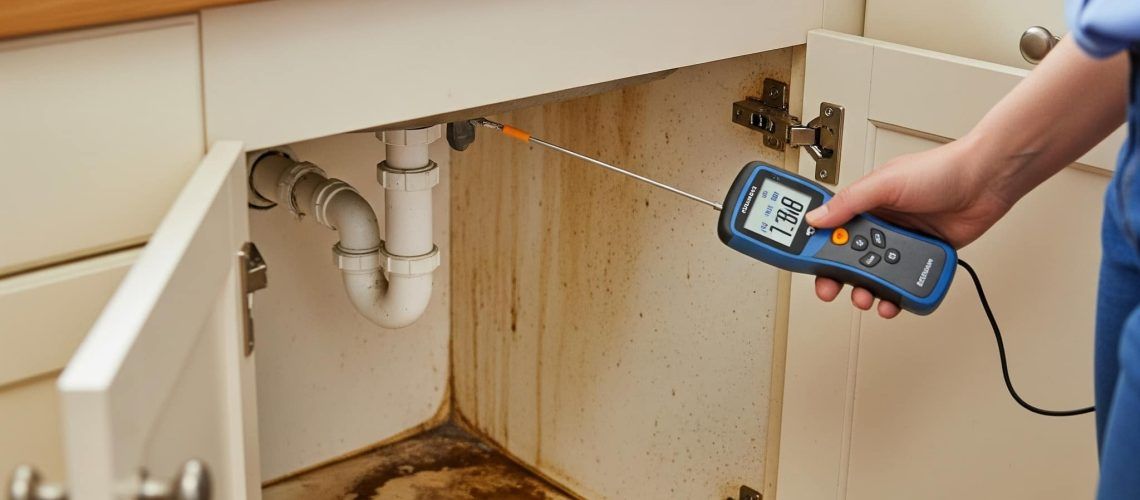
Water leaks are a common issue that many homeowners overlook, yet they can be incredibly damaging when left unchecked. Often, water leaks go unnoticed for weeks or even months, silently causing significant harm to your home. Over time, even a small leak can lead to major issues such as structural damage, mould growth, and increased water bills. The worst part is, without early detection, these problems can escalate into costly repairs that could have easily been avoided.
That’s why it’s so important to act quickly at the first signs of a leak. Early water leak detection not only helps you avoid expensive repairs, but it also ensures the safety and longevity of your home. This guide is here to help you recognise the signs of water leaks, understand the different types, and learn practical methods for detecting them. Whether you’re tackling small issues yourself or bringing in the professionals, knowing what to look for and how to respond is key. Let’s dive into the essential steps for identifying and addressing water leaks before they cause irreversible damage.
An Overview: The Importance of Identifying Water Leaks Early
Identifying water leaks early is essential for safeguarding both the structure of your home and your wallet. When leaks go undetected, they can cause serious and often costly damage to your property. Water can seep into walls, ceilings, and foundations, weakening structural elements and leading to expensive repairs. Over time, persistent leaks can result in mould growth, wood rot, and corrosion, all of which compromise the safety and livability of your home. Early detection of leaks enables you to take swift action, preventing extensive damage and minimizing the repair costs.
In addition to protecting your home, catching leaks early also helps conserve water, a vital resource that’s often taken for granted. Unnoticed leaks can waste thousands of litres of water, which drives up your utility bills and contributes to water scarcity. By identifying and fixing leaks promptly, you not only save money on repairs but also reduce your environmental footprint, promoting sustainability. Early leak detection is a small investment that can have a significant impact, ensuring the long-term health of both your home and the planet.
Early detection of water leaks is essential to:
- Prevent Costly Repairs: Addressing leaks promptly can save you money in the long run. The longer a leak goes undetected, the more extensive the damage and the costlier the repairs.
- Protect Your Home’s Structure: Water can weaken foundations, damage walls and ceilings, and promote mold growth. Detecting leaks early helps maintain the structural integrity of your home.
- Conserve Water: Water leaks can waste thousands of gallons of water, contributing to water scarcity and higher utility bills. Identifying and fixing leaks conserves this precious resource.
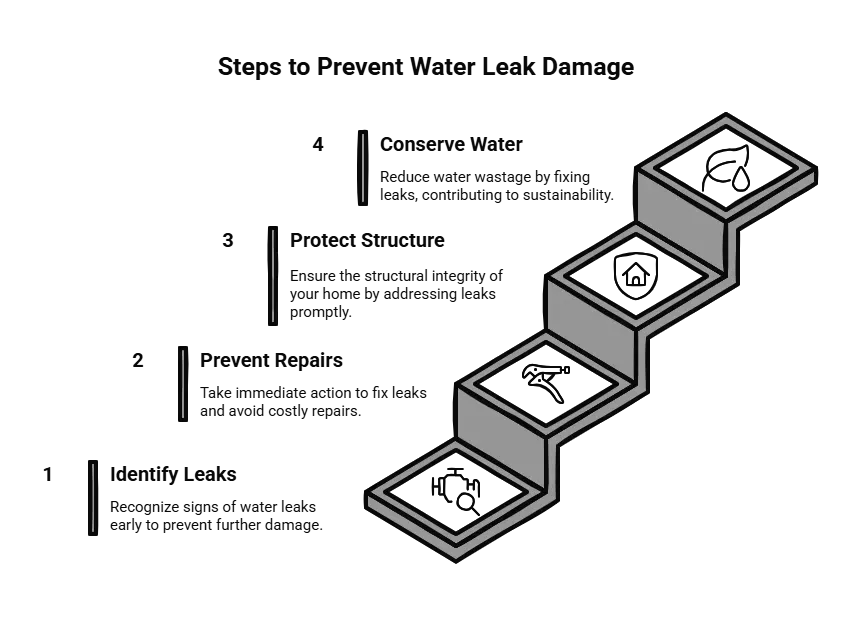
2. Common Signs of Water Leaks
Identifying water leaks often begins with recognising the signs.
“Common signs of a water leak are like whispers from your home, urging you to pay attention. Don’t ignore their gentle warnings; they can save you from a flood of troubles.”
Andy, Zen Plumbing, Byron Bay
Some of the common indicators include:
- Visible Water Stains: Stains on ceilings, walls, or floors are telltale signs of water leaks. These stains can appear discoloured or have a brownish hue.
- Mold and Mildew: The presence of mold or mildew, especially in areas like bathrooms or basements, suggests excess moisture and a potential leak.
- Peeling Paint or Wallpaper: Paint or wallpaper that is peeling or bubbling can be a result of moisture seeping through walls.
- Increased Water Bills: A sudden and unexplained increase in your water bills can indicate an undetected leak.
- Musty Odors: A persistent musty smell in your home can be a sign of hidden water damage.

3. Types of Water Leaks
Water leaks can manifest in various ways and locations in your home:
- Plumbing Leaks: These can include dripping faucets, running toilets, and burst pipes.
- Roof Leaks: Damage to your roof, such as missing shingles or cracked flashing, can lead to water leaks during rainfall.
- Foundation Leaks: Water can seep into basements or crawl spaces through cracks in the foundation or poor drainage.
- Appliance Leaks: Dishwashers, washing machines, and water heaters can develop leaks over time.
Understanding the type of leak you’re dealing with is crucial in determining the appropriate detection and repair methods.
4. DIY Water Leak Detection
While there are a few DIY methods homeowners can use to detect water leaks, it’s important to remember that when it comes to your home’s safety and the risk of extensive water damage, professional help is always the better choice. Although attempting a DIY approach can save time in the short term, the potential for missing hidden leaks or causing further damage makes professional services like Zen Plumbing a much more reliable option.
Here are some basic DIY methods for detecting leaks:
- Visual Inspection: Check ceilings, walls, and floors regularly for stains, peeling paint, or signs of water damage. While this may help spot obvious leaks, many leaks are hidden behind walls or under floors, where you can’t easily see them.
- Check Water Meter: Turn off all water sources in your home and monitor your water meter. If it continues to show usage, there’s likely a leak somewhere. However, this method can’t help you pinpoint where the leak is or how severe it is.
- Listen for Dripping: In a quiet room, you may hear the sound of water dripping. This can be helpful, but it won’t reveal the full extent of the problem, especially if the leak is hidden underground or in the walls.
- Use a Moisture Meter: Moisture meters can help detect hidden leaks in walls and floors. While they can be useful, they are not foolproof and may not reach deeper, more complex leaks, especially in areas with limited access.
“Water leaks may seem small, but their impact can be enormous. Don’t hesitate to call Zen when in doubt. It’s an investment in your home’s well-being and your peace of mind.”
Andy, Zen Plumbing, Byron Bay
While DIY methods can give you a basic idea of whether a leak exists, they often miss hidden leaks or provide insufficient information about the severity of the problem. For accurate detection and fast, effective repairs, calling in the experts at Zen Plumbing is always the best choice. Our team uses advanced tools and techniques to quickly locate even the most elusive leaks, saving you time, money, and stress in the long run.
5. Professional Water Leak Detection Services
Detecting water leaks can be a complicated task, especially when they are hidden behind walls, under floors, or in other hard-to-reach areas. While DIY methods can help, they often miss deeper, more difficult-to-find leaks. This is where professional services like Zen Plumbing come in, offering the specialised expertise and advanced equipment needed to pinpoint leaks with accuracy and precision.
Our team uses cutting-edge technologies to ensure leaks are detected quickly and without causing unnecessary damage to your property:
- Infrared Thermography: Professionals use thermal imaging cameras to detect temperature anomalies caused by water leaks. This non-invasive technique is particularly effective for identifying hidden leaks.
- Acoustic Leak Detection: Specialized equipment can detect the sound of water escaping from pipes, helping experts locate leaks within walls or underground.
- Pressure Testing: By pressurizing the plumbing system, professionals can identify leaks by monitoring pressure changes, making it a valuable tool for detecting hidden leaks.
- Ground Penetrating Radar (GPR): GPR technology is used to locate leaks beneath concrete slabs or in other hard-to-reach areas.
The teams from ZenPlumbing not only locate leaks accurately but also provide actionable information for repair, reducing the need for unnecessary excavation or disruption.
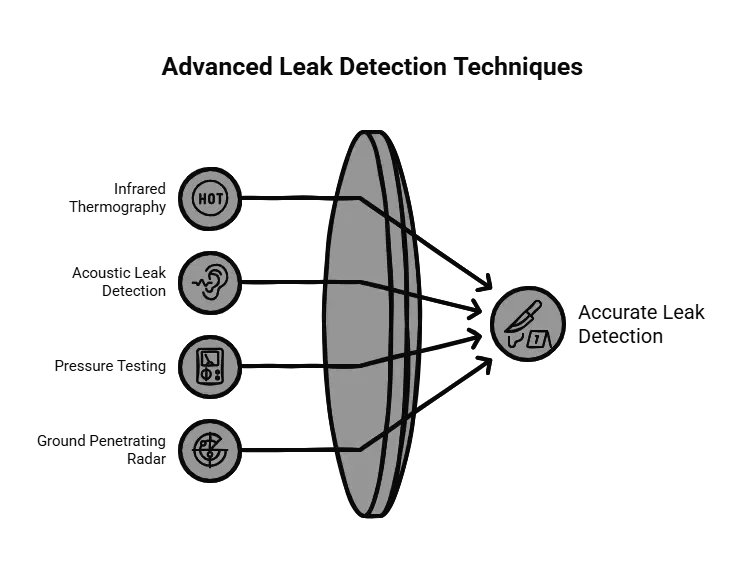
6. Fixing Plumbing Leaks
Once a water leak is detected, it’s crucial to address it as soon as possible to prevent further damage. Plumbing leaks, if left unattended, can escalate quickly, causing extensive water damage to your home. Here are some common plumbing leaks and how they can be repaired:
- Dripping Faucets: Usually caused by worn-out washers, these can be fixed by replacing the washer or faucet cartridge.
- Running Toilets: Often due to a faulty flapper or fill valve, these can be repaired by replacing the necessary parts.
- Burst Pipes: A burst pipe is a more significant issue, requiring immediate attention. Shut off the water supply and call a professional plumber for repair.
7. Repairing Roof Leaks
Roof leaks are a common source of water infiltration and can cause significant damage if left unresolved. If you notice signs of a roof leak, it’s important to address it promptly to prevent further issues like mould growth and structural damage. Here’s how you can handle roof leaks:
- Inspect the Roof: Look for visible damage, such as missing or damaged shingles, and replace or repair as needed.
- Flashing Repair: Damaged or improperly sealed flashing around roof penetrations (e.g., chimneys, vents) can be a source of leaks. Replacing or resealing flashing is necessary.
- Professional Roof Inspection: For persistent or hard-to-locate leaks, Call Zen Plumbing for a comprehensive inspection and repair.
8. Foundation Leak Remediation
Foundation leaks are serious and can compromise the structural integrity of your home, leading to costly repairs and long-term issues. Addressing foundation leaks promptly is crucial to maintaining the stability of your property. Here are key steps for dealing with foundation leaks:
- Address Drainage Issues: Ensure that your property has proper drainage to redirect water away from the foundation.
- Seal Cracks: Foundation cracks can allow water to seep in. Seal them with appropriate materials to prevent further leaks.
- Install a Sump Pump: In basements prone to flooding, a sump pump can help manage water and prevent damage.
Dealing with foundation leaks requires specialised knowledge and equipment. Zen Plumbing has the expertise to accurately locate and repair foundation leaks, ensuring your home remains structurally sound and protected from water damage. If you suspect a foundation leak, don’t hesitate to contact us for a professional inspection and timely repairs.
9. Water Damage Restoration
Water leaks can cause extensive damage, leading to issues such as mould growth, structural damage, and the deterioration of building materials. Water damage restoration is an essential process to minimise the impact of leaks and restore your home to its original condition. Here’s how the restoration process typically works:
- Assessment: Begin by assessing the extent of the damage. Identify affected areas, materials, and potential health risks, such as mould.
- Water Extraction: Remove standing water and excess moisture using specialized equipment like water pumps and dehumidifiers.
- Mold Remediation: Address any mold growth promptly. This may involve cleaning and disinfecting affected areas or removing and replacing contaminated materials.
- Structural Repairs: Repair or replace damaged building materials, such as drywall or flooring, to restore the structural integrity of your home.
- Restoration and Renovation: Finally, restore your home to its pre-damage condition. This may include painting, re-flooring, and any necessary cosmetic repairs.
Water damage restoration is a vital process that requires professional expertise to mitigate the aftermath of water leaks. Zen Plumbing is equipped with the knowledge and tools to provide comprehensive water damage restoration, helping to restore your home quickly and efficiently. If your home has experienced water damage, don’t delay – contact us to get the restoration process started.
10. Preventative Measures for Leak Prevention
Preventing water leaks is often more cost-effective and less stressful than dealing with the aftermath. By taking proactive steps, you can protect your home from potential damage and avoid costly repairs down the line.
“Preventing water leaks is smart protection against unexpected headaches. Don’t underestimate the power of prevention.”
Andy, Zen Plumbing, Byron Bay
Consider these preventative measures:
- Regular Inspections: Conduct routine inspections of your plumbing, roof, and foundation to identify and address potential issues early.
- Proper Insulation: Ensure that pipes are well-insulated, especially in colder climates, to prevent freezing and bursting.
- Roof Maintenance: Regularly maintain your roof by repairing or replacing damaged shingles, sealing flashing, and cleaning out gutters to prevent blockages.
- Foundation Maintenance: Address any foundation cracks or drainage issues promptly to prevent water infiltration.
- Appliance Maintenance: Maintain your appliances, such as water heaters and washing machines, to prevent leaks and malfunction.
11. Environmental Impact of Water Leaks
Water leaks not only pose a threat to your home but also have significant environmental consequences. When left unchecked, leaks can waste a precious resource, strain energy systems, and harm local ecosystems.
- Wasted Water: Leaks can waste thousands of gallons of water, contributing to water scarcity, particularly in regions facing droughts.
- Energy Consumption: Excess water usage due to leaks can increase energy consumption for water heating and treatment.
- Ecosystem Impact: Excess water can also harm local ecosystems by overloading drainage systems and causing soil erosion.
Understanding the environmental impact of water leaks highlights the importance of responsible water management and early leak detection. By addressing leaks quickly, you’re not only protecting your home but also playing a part in conserving water, reducing energy use, and safeguarding the environment.
12. Insurance Coverage for Water Leaks
When dealing with water leaks, it’s essential to understand how your homeowner’s insurance covers water damage. In many cases, insurance policies vary, and knowing what is and isn’t covered can help you avoid costly surprises down the line. Here’s how to navigate the process:
- Review Your Policy: Start by carefully reviewing your insurance policy to understand what types of water damage are covered. Some policies cover damage caused by sudden, accidental leaks, while others may exclude certain types of water damage, such as gradual leaks or those resulting from poor maintenance.
- File a Claim: If your policy covers the damage, promptly file a claim with your insurance company. The sooner you notify them, the faster the claims process can begin, which is crucial in preventing further damage to your home.
- Document Damage: To facilitate the claims process, thoroughly document the damage. Take clear photographs and make detailed descriptions of the affected areas. This documentation will help the insurance adjuster assess the damage accurately and ensure you receive the compensation you’re entitled to.
- Consult an Adjuster: An insurance adjuster will assess the extent of the damage and help determine whether the leak is covered under your policy. Their expert evaluation can ensure the proper compensation is provided for repairs.
The key takeaway here is that the sooner you act, the better. Calling for help right away – whether it’s an insurance claim or professional leak detection – can save you money, minimise damage, and ensure your home is protected. Don’t wait until it’s too late; addressing the issue promptly is the best way to safeguard your property and finances.
After Hours? Talk To Our Highly Trained 24 Hour Plumbers Now!
Our team of 24-hour Plumbers are on call 24/7 – 365 days of the year. We will HELP YOU with any plumbing situation.
We have local plumbers ready to help you in Byron Bay, Mullumbimby, Cabarita Beach, Tweed Heads, Gold Coast, and everywhere in between.
Call us now to speak to a 24-hour plumber and we’ll advise you for FREE on what you should do next…

